Trisha Paytas already shares daughters Malibu Barbie, 2, and Elvis, 13 months with husband Moses Hacmon.
Italian girl names are trending in the United States — and it’s easy to see why!
Just look at the name Mia, which comes directly from the Italian word meaning “mine.” Mia was the fifth most popular girls name in the U.S. in 2024, according to the Social Security Administration (SSA).
Isabella (Italian form of Elizabeth) and Sofia (Italian form of Sophia) also cracked the top-10 in 2024.
RELATED: 55+ Irish Girls Names With Beautiful and Inspiring Meanings
Other Italian names for girls that ranked in the SSA’s top-50 include Luna, meaning “moon,” Gianna, the Italian form of Joanna or Jane, and Aria, meaning “air” or “song” via the Italian word aria.
There are also a few Roman (ancient Italy) and Latin (but used in Italy) options that rank well in the U.S..
For example, Aurora, the name of the Roman goddess of the morning, ranked 16th in the U.S. last year, but is technically Latin in origin, according to Behind the Name.
Emily and Valentina, both of which derive from Roman cognomens via Latin words, also cracked the top-50 in 2024, while Lucia, meaning “light” in Latin (but used in Italy), ranked in the top-100, per the SSA.
But don’t stop your search there — here are 60+ more Italian girl names to consider for your daughter!
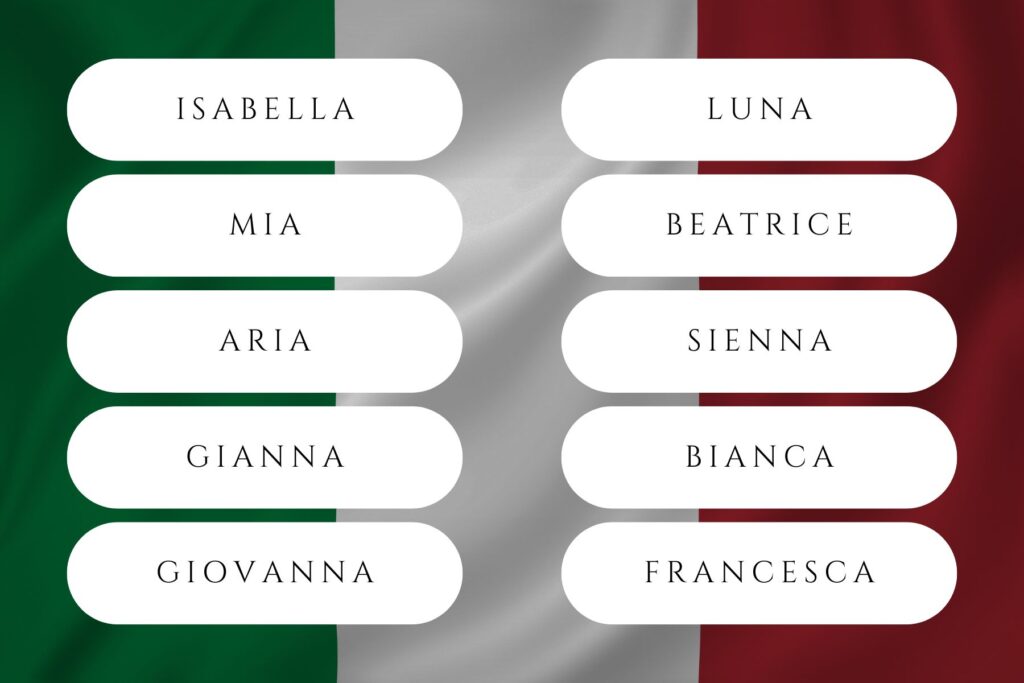
Isabella
Origin: Italian; Spanish; Hebrew
Meaning: God’s oath; Oath to God
Isabella, pronounced iz-uh-BEL-uh, is the Italian and Spanish form of Elizabeth, which comes from the Hebrew name Elisheva and is composed of the Hebrew elements el, meaning "God," and shava, meaning "oath."
Mia
Origin: Hebrew; Italian
Meaning: Sea of bitterness; Mine
Mia, pronounced MEE-uh, is sometimes considered a diminutive of Maria or Mary, meaning “sea of bitterness,” but also acts as a stand alone name derived from the Italian word mia, meaning "mine."
Aria
Origin: Italian; Indo-Iranian
Meaning: Air; Melody; Song; Noble
Aria, pronounced AHR-ee-uh, comes from the Indo-Aranian root āriya, meaning “noble,” and the Italian word aria, meaning "melody" or "song." It’s also the name of a luxurious hotel-casino in Las Vegas, NV.
Gianna
Origin: Italian; Hebrew
Meaning: God is gracious; God’s grace
Gianna, pronounced jee-AH-nuh, is the Italian shortened form of Giovanna, which is the feminine form of Giovanni and ultimately derives from the Hebrew name Yoḥanan (John), meaning “God is gracious.”
Giovanna
Origin: Italian; Hebrew
Meaning: God is gracious
Giovanna, pronounced jee-oh-VAH-nuh, is the Italian form of Joanna, which derives from the Hebrew name Yohanan and is composed of the elements yo, meaning “God,” and hanan, meaning “to be gracious.”
Luna
Origin: Italian; Latin; Spanish
Meaning: Moon
Luna, pronounced LEW-nuh, comes directly from the Italian, Spanish and Latin word luna, meaning “moon.” In Roman mythology, Luna is the goddess of the moon and divine embodiment of the celestial orb.
Beatrice
Origin: Italian; Latin
Meaning: Voyager; Traveler
Beatrice, pronounced BEE-uh-triss, is the Italian form of Beatrix that’s believed to come from Viatrix, which is the feminine form of the Late Latin name Viator, meaning “voyager” or “traveler” in Latin.
Sienna
Origin: Italian
Meaning: Orange-red; Clay material
Sienna, pronounced see-EN-uh, takes its name from the Italian city of Siena and the reddish-brown earth pigment mined there. The Terra di Siena (Earth of Siena) has been used in art since ancient times.
Bianca
Origin: Italian; French; Latin
Meaning: White; Fair-colored
Bianca, pronounced bee-AHN-kuh, is an Italian cognate of Blanche that comes from the feminine form of the French word for “white” or “fair-colored,” which derives from the Latin word blancus, meaning “white.”
Francesca
Origin: Italian; Latin; Germanic
Meaning: Frenchman; Of French origin
Francesca, pronounced fran-CHESS-kuh, is the Italian feminine form of Francis, which comes from the Latin name Franciscus, meaning “Frenchman,” and derives from the Germanic element franko, a type of spear.
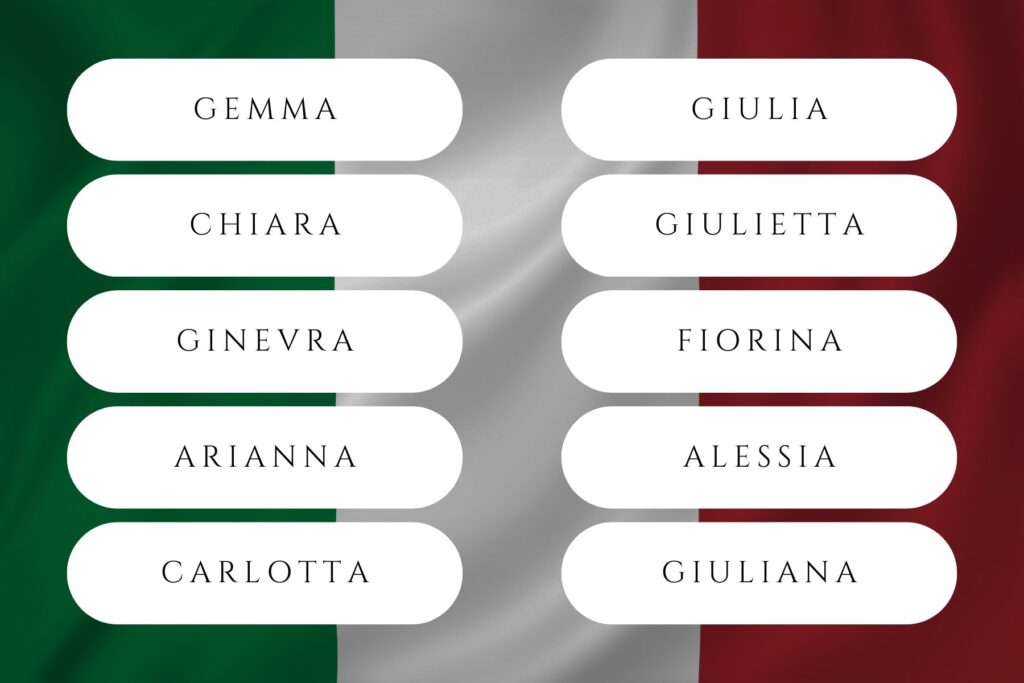
Gemma
Origin: Latin; Italian
Meaning: Gem; Precious stone
Gemma, pronounced JEH-muh, comes from the Latin and Italian word gemma, meaning “gem” or “precious stone.” This name was extremely popular in the 1980s and is now making a comeback.
Chiara
Origin: Italian; Latin
Meaning: Clear; Bright; Famous
Chiara, pronounced kee-AH-rah, is the Italian form of Clarus, which derives from the Latin word clarus, meaning "clear," "bright," or "famous." It was popularized by Saint Clare of Assisi, or Santa Chiara d'Assisi in Italian.
Ginevra
Origin: Italian; Welsh
Meaning: White phantom; Geneva
Ginevra, pronounced jih-NEH-vruh, is the Italian form of Guinevere, which comes from the Welsh name Gwenhwyfar, meaning “white phantom.” It’s also the Italian name for the city of Geneva in Switzerland.
Arianna
Origin: Italian; Greek
Meaning: Most holy
Arianna, pronounced AIR-ee-ah-nuh or AHR-ee-ah-nuh, is the Italian form of the Greek name Ariadne, which is composed of the Greek elements ari, meaning “most,” and adnos, meaning “holy.”
Carlotta
Origin: Italian; Germanic
Meaning: Man; Army
Carlotta, pronounced kar-LOH-tah, is the Italian form of Charlotte, which is the Italian form of the name Charles and, ultimately, derives from the Germanic name Karl, meaning “man” or, less commonly, “army.”
Giulia
Origin: Italian; Greek; Roman
Meaning: Downy-bearded; Youthful
Giulia, pronounced JOO-lee-uh, is the Italian form of Julia and feminine form of the Roman family name Julius, which is believed to derive from the Greek word ioulos, meaning “downy-bearded” or “youthful.”
Giulietta
Origin: Italian; Greek; Roman
Meaning: Downy-bearded; Youthful
Giulietta, pronounced joo-lee-EHT-tuh, is an elaborated form of Giulia and the equivalent of Juliet (as in Romeo and Juliet). It comes from the Roman family name Julius, meaning “downy-bearded” or “youthful.”
Fiorina
Origin: Italian; Roman; Latin
Meaning: Flower
Fiorina, pronounced FEE-uh-ree-nuh, is the Italian feminine form of Florinus, which comes from the Roman cognomen Florus and is believed to derive from the Latin word flos or floris, meaning “flower.”
Alessia
Origin: Italian; Greek
Meaning: Defender; Helper; Protector
Alessia, pronounced uh-LESS-ee-uh, is an Italian form of Alexis, which derives from the Greek word alexo, meaning “to defend” or “to help.” It shares the same root element as Alexander and Alexandra.
Giuliana
Origin: Italian; Greek; Roman
Meaning: Downy-bearded; Youthful
Giuliana, pronounced joo-lee-AH-nuh, is the Italian feminine form of Julian, which comes from the Roman family name Julius and derives from the Greek word ioulos, meaning “downy-bearded” or “youthful.”
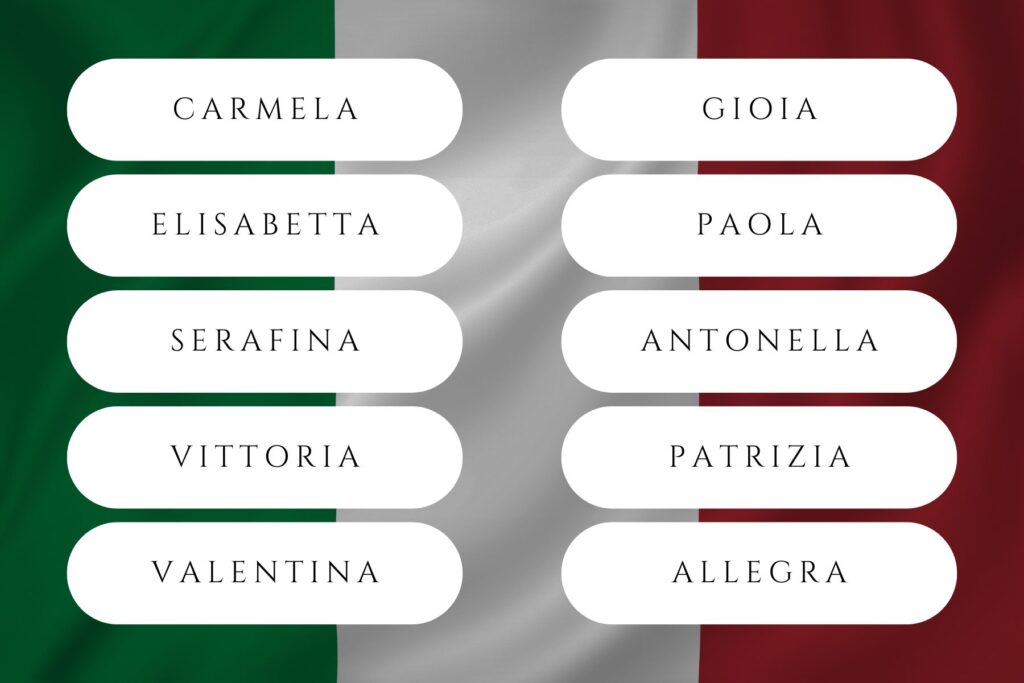
Carmela
Origin: Italian; Hebrew
Meaning: Garden; Vineyard of God
Carmela, pronounced kar-MEL-uh, is the Italian and Spanish form of Carmel, which comes from Mount Carmel in Israel and is derived from the Hebrew word karmel, meaning "garden" or "vineyard of God.”
Elisabetta
Origin: Italian; Hebrew
Meaning: God’s oath, Oath to God
Elisabetta, pronounced EH-lee-zuh-beh-tuh, is the Italian form of Elizabeth, which comes from the Hebrew name Elisheva and is composed of the elements el, meaning “God,” and shava, meaning “oath.”
Serafina
Origin: Italian; Latin; Hebrew
Meaning: Fiery ones
Serafina, pronounced seh-ruh-FEE-nuh, is the Italian and Spanish form of Seraphina, which comes from the Latin name Seraphinus and is derived from the biblical Hebrew word seraphim, meaning “fiery ones.”
Vittoria
Origin: Italian; Latin
Meaning: Victor; Conqueror
Vittoria, pronounced vit-TOR-ee-uh, is the Italian form of Victoria, which is the feminine form of Victorius and Victor, meaning “victor” or “conqueror” in Latin. The masculine form of this name would be Vittorio.
Valentina
Origin: Italian; Roman; Latin
Meaning: Strong; Vigorous; Healthy
Valentina, pronounced vah-len-TEE-nuh, is the Italian form of Valentine, which comes from the Roman cognomen Valentinus and derives from the Latin word valens, meaning “strong,” “vigorous” or “healthy.”
Gioia
Origin: Italian
Meaning: Joy
Gioia, pronounced JOY-yuh, comes directly from the Italian word gioia, meaning “joy.” Gioia Bruno is an Italian pop singer and member of the band Exposé, while Gioia del Colle is a small town located in Italy.
Paola
Origin: Italian; Roman; Latin
Meaning: Small; Humble
Paula, pronounced POW-luh, is the Italian feminine form of Paul, which comes from the Roman family name Paulus and means “small” or “humble” in Latin. This name is also spelled Paula in other countries.
Antonella
Origin: Italian; Roman
Meaning: Priceless one; Flower
Antonella, pronounced an-toh-NEL-ah, is an Italian diminutive of Antonia, which is a variant of Anthony and, ultimately, the Roman family name Antonius. The meaning is unknown, but some theories suggest it means “priceless one” or “flower.”
Patrizia
Origin: Italian; Latin
Meaning: Nobleman
Patrizia, pronounced puh-TREE-see-uh, is the Italian feminine form of Patrick, which comes from the Latin name Patricius, meaning “nobleman.” The masculine form of this name would be Patrizio.
Allegra
Origin: Italian
Meaning: Cheerful; Lively
Allegra, pronounced ah-LEH-grah, comes directly from an Italian word meaning “cheerful” or “lively.” According to Marie Claire, Allegra is a name Princess Diana would’ve considered for her daughter.
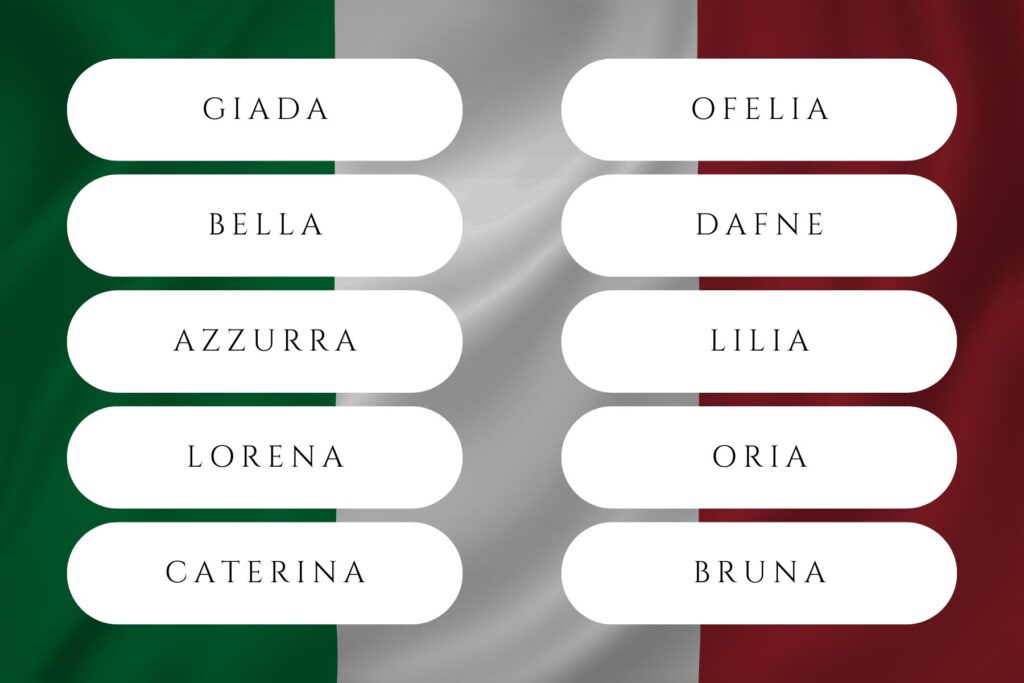
Giada
Origin: Italian; Spanish
Meaning: Jade; Green gemstone; Stone of the flank
Giada, pronounced JAH-dah, is the Italian word for "jade," ultimately derived from the Spanish phrase piedra de ijada, meaning “stone of the flank.” It’s a green gemstone that was once believed to cure kidney ailments.
Bella
Origin: Italian
Meaning: Beautiful; God’s oath; Oath to God
Bella, pronounced BEL-uh, comes directly from the Italian word bella, meaning “beautiful,” but is also considered a diminutive or nickname of Isabella and Elizabeth, meaning “oath to God” or “God’s oath.”
Azzurra
Origin: Italian
Meaning: Azure; Sky blue; Light blue
Azzurra, pronounced ah-ZOO-rah, comes from an Italian word meaning “azure” or “sky blue.” It doesn’t refer to a specific color, but is generally used in a broader sense for any shade of light blue or sky blue.
Lorena
Origin: Italian; Roman; French
Meaning: Crowned in laurel; From Laurentum; From Lorraine
Lorena, pronounced loh-REN-ah, is the Italian form of Lauren, meaning “crowned in laurel” or “from Laurentum,” but can also be an Italian form of Lorraine, referring to a historical region in Eastern France.
Caterina
Origin: Italian; Greek
Meaning: Each of the two; Pure
Caterina, pronounced ka-tuh-REE-nuh, is the Italian and Catalan form of Katherine, which is believed to come from the Greek name Hekaterine and Greek word hekateros, meaning “each of the two.” It’s also commonly linked to the Greek word katharos, meaning “pure.”
Ofelia
Origin: Italian; Greek
Meaning: Help; Advantage
Ofelia, pronounced oh-FEL-ee-uh, is the Italian form of Ophelia, which comes from the Greek word opheleia, meaning “help” or “advantage.” It was popularized by poets Jacopo Sannazaro and William Shakespeare.
Dafne
Origin: Italian; Greek
Meaning: Laurel
Dafne, pronounced DAF-nee, is the Italian form of Daphne, which comes from the Greek word daphne, meaning “laurel.” In Greek mythology, Daphne was a nymph turned into a laurel tree by her father.
Lilia
Origin: Italian; Latin
Meaning: Lily flower
Lilia, pronounced LIH-lee-uh, is the Italian and Latinate form of Lily, which comes from the Latin root lilium, referring to the lily flower. Both Lily (24th) and Lilia (920th) ranked in the SSA’s top 1,000 in 2024.
Oria
Origin: Italian; Latin
Meaning: Golden
Oria, pronounced OH-ree-ah, is the Italian form of the Late Roman name Aurea, which comes from the Latin word aureus, meaning “golden.” Parents can also consider Orietta, an Italian diminutive of Oria.
Bruna
Origin: Italian; Old German
Meaning: Armor; Protection; Brown
Bruna, pronounced BROO-nuh, is the Italian feminine form of Bruno, which comes from the Old German element brunna, meaning “armor” or “protection.” It’s also linked to the element brun, meaning “brown.”
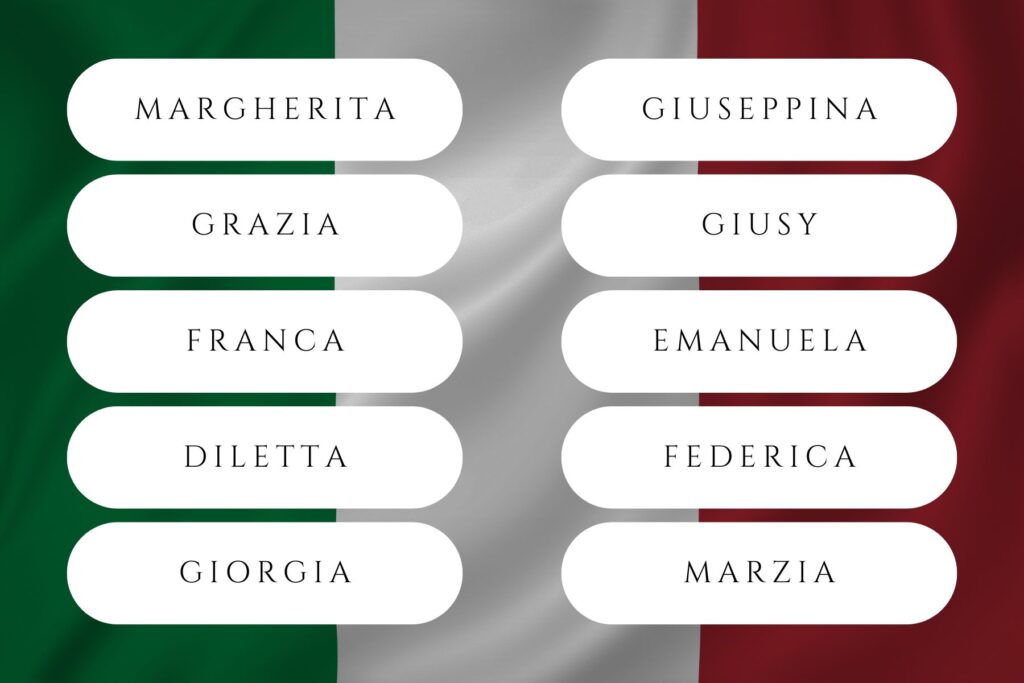
Margherita
Origin: Italian; Greek
Meaning: Pearl; Daisy flower; Pizza
Margherita, pronounced mar-geh-REE-tah, is the Italian form of Margaret and Margarita, which come from the Greek word margarites, meaning “pearl.” It’s also the Italian word for the daisy flower.
Grazia
Origin: Italian; Latin
Meaning: Grace; Favor
Grazia, pronounced GRAHT-see-ah, comes directly from the Italian word for “grace,” which ultimately comes from the Latin word gratia. In English, grace means “simple elegance,” “approval” or “favor.”
Franca
Origin: Italian; Latin
Meaning: Frenchman; Franks; Spear
Franca, pronounced FRANG-kuh, is a contracted form of Francesca, which comes from the Late Latin name Franciscus (Francis), meaning “Frenchman” and referring to the Germanic tribe of the Franks.
Diletta
Origin: Italian; Latin
Meaning: Beloved
Diletta, pronounced dee-LEH-tah, comes directly from the Italian word diletta, which derives from the Latin word dilectus, meaning “beloved.” Diletta Leotta is an Italian television presenter from Sicily.
Giorgia
Origin: Italian; Greek
Meaning: Earthworker; Farmer
Giorgia, pronounced JOR-juh, is the Italian feminine form of George, which comes from the Greek name Georgios and derives from the Greek word georgos, meaning “earthworker” or referring to a “farmer.”
Giuseppina
Origin: Italian; Hebrew
Meaning: He will add; He increased
Giuseppina, pronounced joo-SIH-pee-nuh, is the feminine form of Giuseppe, which is the Italian form of Joseph derived from the Hebrew name Yosef and Hebrew word yasaf, meaning “to add” or “to increase.”
Giusy
Origin: Italian; Hebrew
Meaning: He adds, He increases
Giusy, pronounced JOO-see, is a variant of Giusi, which is a shortened form of the names Giuseppa, Giuseppina and Giuseppe — all of which are the Italian form of Joseph, meaning “to add” in Hebrew.
Emanuela
Origin: Italian; Hebrew
Meaning: God is with us; With God
Emanuela, pronounced ee-man-WEL-uh, is the Italian form of Emmanuel, which comes from the Hebrew name Immanu’el and is composed of the Hebrew elements im, meaning “with,” and el, meaning “God.”
Federica
Origin: Italian; Old German
Meaning: Peaceful ruler; Peace to the king
Federica, pronounced feh-deh-REE-kah, is the Italian feminine form of Frederick, which comes from an Old German name composed of the elements fridu, meaning “peace,” and rih, meaning “king” or “ruler.”
Marzia
Origin: Italian; Roman
Meaning: Dedicated to Mars; God of war
Marzia, pronounced MAR-see-ah, is the Italian form of Marcia and Marcius, which comes from the Roman family name Marcus and derives from the name of Mars, referring to the ancient Roman god of war.
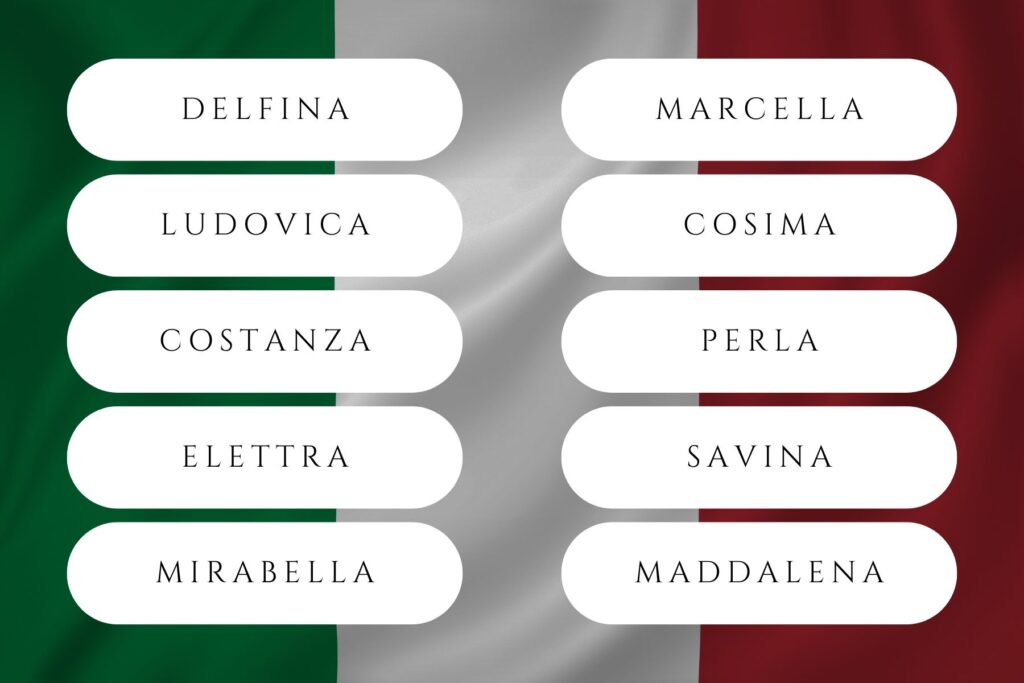
Delfina
Origin: Italian; Latin
Meaning: Of Delphi; Womb
Delfina, pronounced del-FEE-nah, is the Italian form of Delphina, which comes from the Latin name Delphinus and means “of Delphi,” referring to an ancient city in Greece. It’s also linked to the Greek word delphys, meaning “womb.”
Ludovica
Origin: Italian; Germanic
Meaning: Famous in battle; Famous warrior
Ludovica, pronounced loo-doh-VIH-kuh, is the Italian feminine form of Ludwig, which comes from the Germanic name Hludwig and is composed of the elements hlut, meaning “famous,” and wig, meaning “war.”
Costanza
Origin: Italian; Late Latin
Meaning: Constant; Steadfast
Costanza, pronounced KOH-stahn-zah, is the Italian feminine form of Constans, which means “constant” or “steadfast” in Late Latin. It was the name Roman emperor Constantine the Great chose for his son.
Elettra
Origin: Italian; Latin; Green
Meaning: Amber; Shining bright
Elettra, pronounced ee-LET-trah, is the Italian form of Electra, which is the Latinized form of the Greek name Elektra derived from the Greek word elektron, meaning “amber.” It can also mean “shining bright.”
Mirabella
Origin: Italian; Latin
Meaning: Wonderful; Beautiful sea
Mirabella, pronounced mee-rah-BEL-ah, is the Italian form of Mirabelle, which comes from the Latin word mirabilis, meaning “wonderful.” It can also be a combination of the names Mira, meaning “sea,” and bella, meaning “beautiful.”
Marcella
Origin: Italian; Roman
Meaning: Dedicated to Mars; War-like
Marcella, pronounced mar-SEL-ah, is the Italian feminine form of Marcellus, which comes from a Roman family name derived from Marcus and, ultimately, Mars, referring to the ancient Roman god of war.
Cosima
Origin: Italian; Greek
Meaning: Order; Universe; World
Cosima, pronounced KOH-zee-mah, is the Italian feminine form of Cosimo, which is the Italian form of Cosmas derived from the Greek name Kosmas and Greek word kosmos, meaning “order” or “universe.”
Perla
Origin: Italian; Latin
Meaning: Pearl; Gemstone
Perla, pronounced PAIR-lah, is the Italian and Spanish cognate of Pearl, which comes from the Latin word perla, referring to the hard, lustrous gem produced within the soft tissue of a living shelled mollusk.
Savina
Origin: Italian; Roman; Latin
Meaning: Sabine; Of Sabine origin
Savina, pronounced sah-VEE-nuh, is an Italian variant of Sabina, which comes from a Roman cognomen meaning “a Sabine” in Latin. The Sabines were an ancient group of people who lived in central Italy.
Maddalena
Origin: Italian; Aramaic
Meaning:
Maddalena, pronounced mad-duh-LEH-nah, is the Italian form of Magdalene, which comes from a title meaning “of Magdala,” referring to a village on the Sea of Galilee. The name is believed to mean “tower” in Aramaic.
Stella
Origin: Italian; Latin
Meaning: Star
Stella, pronounced STEL-ah, comes directly from the Italian and Latin word stella, meaning “star.” It has been a top-100 girl’s name in the United States every year since 2010 and a top-50 name since 2016.
What Are the Most Popular Italian Girl Names in Italy?
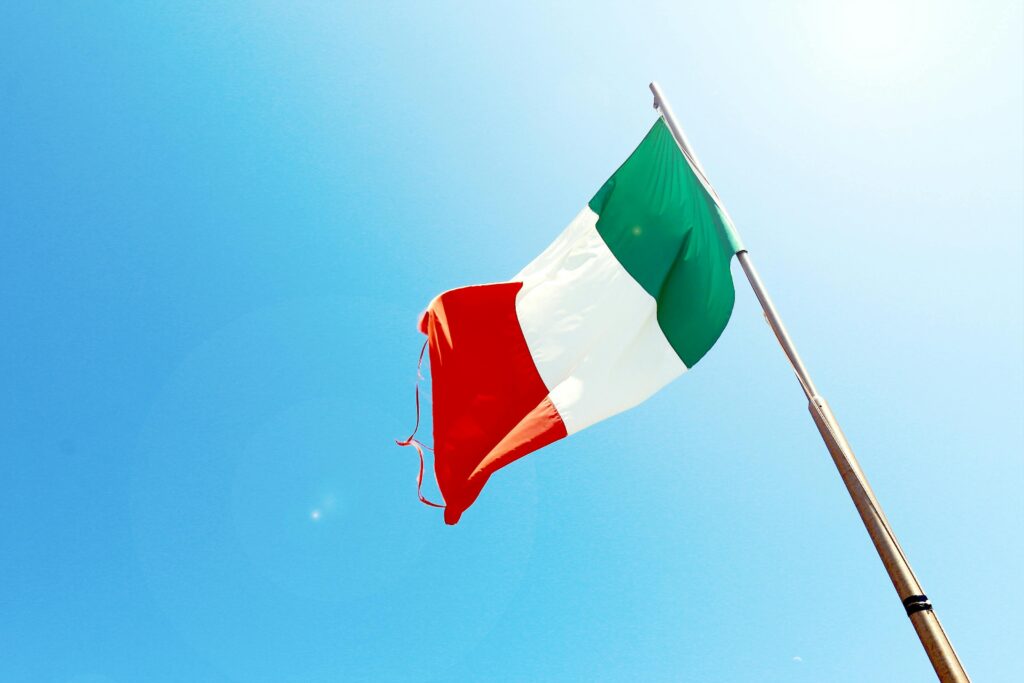
Much like the United States has the Social Security Administration, Italy has Istat.
Istat, the Italian National Institute of Statistics, releases annual data on baby names in Italy as part of its annual report on births based on data collected from Italian Registry Offices, according to its website.
And to no one’s surprise, Sofia (which ranked 8th in the US in 2024) came in at No. 1 in 2023, per Istat.
While the top-10 is filled with classic Italian girls names, two of the most popular girl names in Italy in 2023 (the most recent data) are actually French (Alice) and German (Emma) in origin.
Here’s a look at the girl names that cracked the top-20, according to Istat:
| 1. Sofia | 6. Beatrice | 11. Anna | 16. Nicole |
| 2. Aurora | 7. Ludovica | 12. Camilla | 17. Giorgia |
| 3. Ginevra | 8. Alice | 13. Bianca | 18. Isabel |
| 4. Vittoria | 9. Emma | 14. Azzurra | 19. Greta |
| 5. Giulia | 10. Matilde | 15. Chiara | 20. Noemi |
Anna (Hebrew), Nicole (French) and Isabel (Spanish) are other non-Italian girl names popular in Italy.
But if you’ve just about had it with Italian baby girl names, then don’t worry — you’re not alone!
ALSO ON MOD MOMS CLUB: 65+ Trendy Nature Girl Names That Celebrate Earth’s Beauty
There’s nothing wrong with expanding your baby name search beyond these Italian favorites. And if you need some inspiration, Mod Moms Club has you covered with our easy-to-use baby name generator!












